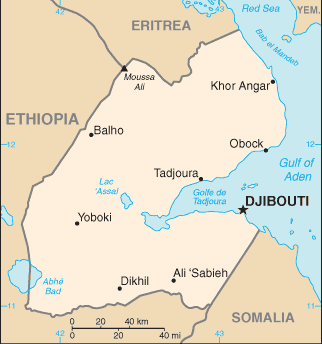Africa > Djibouti: Weather, Map, Costs and Travel Guide

Djibouti : When and where to go?
Click on a city for complete climate and weather tables
| Town | Jan | Feb | Mar | Apr | May | June | July | Aug | Sept | Oct | Nov | Dec |
| Djibouti |  |  |  |  |  |  |  |  |  |  |  |  |
Djibouti: Climate & Weather
Djibouti is generally experiencing a torrid climate with two distinct seasons: a cooler season from October to April with east winds bringing a little humidity, and from June to August a warm season with temperatures Reach 45 ° C. September and May are intermediate months.
The cool season is more pleasant, there may even be some precipitation, and temperatures that revolve around 25 ° C. It is therefore advisable to visit Djibouti between November and the beginning of April to avoid the hot heat, choosing preferably December and January which are the coolest months.
Weather today

Partly Cloudy
Wind: 5 km/h
Precipitation forecast: 0 mm
> Full report and 7-days forecast
Data updated at 06:18 (local time)
At that time, the weather was:
 24 °C / Mostly Cloudy
24 °C / Mostly Cloudy
Djibouti: Map

Sponsored links
What to do in Djibouti
On your way to Ali Sabieh, you will cross magnificent landscapes, such as the deserts of Petit Bara and Grand Bara, and discover traditional Afghan encampments on the outskirts of the city. To see, the houses all white incrusted with coral in Ali Sabieh. Another city to visit is Tadjourah, the city with seven mosques, set in a superb environment of peaks that exceed one thousand meters of altitude, and bordered by the sea where the coral reefs offer amateurs diving wonderful sites. And you can discover the house of Arthur Rimbaud ...
One hour from Djibouti by road, Assal Lake is located 153 meters below sea level, making it the lowest point on the African continent, and the third in the world. Encircled by volcanoes and black lava, its emerald color stands out against a background of dark mountains and azure skies, and there are trucks carrying salt from the lake to the high plateaus of Ethiopia. You can even swim there.
To discover the lake Abbe, you will need a day from Djibouti: but you will not regret your journey by discovering the forest of limestone chimneys erected between the springs that bubble up leaving sulfur-smelling smells like a landscape Come from another planet. Some nomads cross these places, but they are especially the refuge of thousands of birds, ibis, pelicans and flamingos that you may see fly away as in a dream.
At 80 kilometers from Lake Assal is the prehistoric site of Balho, with cave paintings recently discovered.
For a bit of freshness, explore the Day Forest, where the oasis of Bankoualé offers its waterfall that waters the lush gardens planted with palm trees so special of this region and from which you can admire the area of Mount Goda, Which contains at its summit species that have disappeared from the rest of the country: giant juniper, olive, jujube, acacia, fig tree ...
Djibouti: The basics
The current currency is the Djiboutian franc, or DJF.
There is only one international airport in the country, 7 km from the capital, and there are regular flights from Paris. You can also arrive by bus from Ethiopia.
To travel on the spot, it is best to rent a car, usually with driver, to be able to access all the sites of interest: a 4X4 is even strongly advised. It is quite complicated to visit Djibouti independently, and it is easier to travel on organized excursions.
One can live in Djibouti without spending much, if one accepts not to occupy a room of luxury and that one eat in small restaurants: count about 75 € per day all inclusive.
In terms of health, you need to be vaccinated against yellow fever, and you are advised to have your current vaccines up to date, as well as those against typhoid and hepatitis A and B. Avoid swimming in lakes or Other stagnant water, and only drink bottled water.
General security is good in Djibouti, even in the city, with the exception of pickpockets in busy places. However, due to its geographical position close to Somalia and Eritrea, Djibouti remains a sensitive area, and some public places may be the target of terrorist attacks. Border regions should be avoided. Greater vigilance is needed everywhere.



